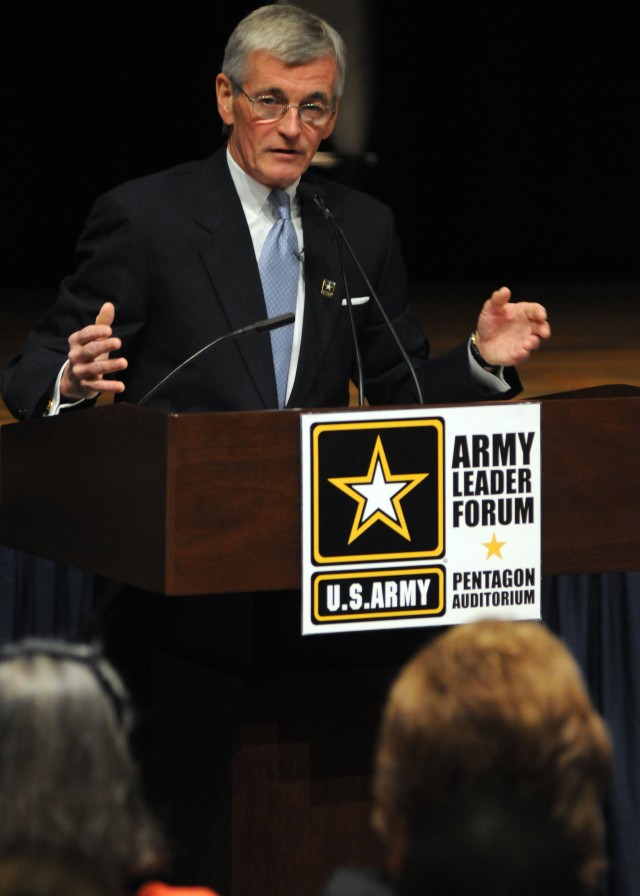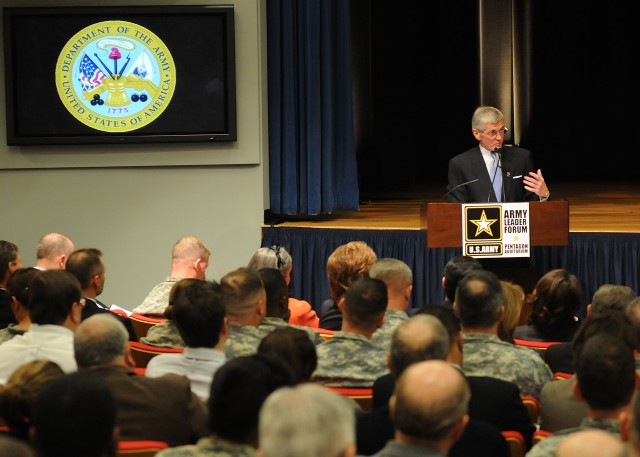WASHINGTON (Army News Service, Jan. 7, 2009) -- Secretary of the Army John McHugh gave Pentagon staffers a "preliminary report" Wednesday after his first three months in office, asking them to continue supporting Soldier and family programs, continue acquisition reform, and focus more on congressional outreach.
McHugh, who took office Sept. 21, spoke to more than 400 members of the Army staff and secretariat in the Pentagon auditorium at an Army Leader Forum.
He expressed his admiration for those who serve, stating, "The most important thing we do is take care of our Soldiers and take care of our families." There is a "critical interdependence" between Soldiers and families in relation to readiness, he said, especially with an all-volunteer force.
Continuing to improve the availability and excellence of quality-of-life programs is essential after almost nine years of war, even as funding may decrease in coming years, he said, adding this imperative must be balanced with vital efforts to modernize the force.
Facing persistent conflict, he said the Army must transform the way it develops its leaders to prepare them for "hybrid threats" and ambiguous situations. He said the Army must train its leaders to be comfortable in dealing with uncertainty by teaching them "how to think" as well as a doctrinal baseline of "what to think."
"Technology does not in and of itself lift the fog of war," McHugh said. He said leaders need to be comfortable with greater decentralized authority from the troop level to the institutional level in order to encourage bottom-up solutions. Of course, he said the Army must also ensure that robust service-wide standards are in place.
One challenge the Army continues to face, he said, is reforming the acquisition process.
"In too many instances, the so-called traditional acquisition process has not been as agile, flexible and efficient as the force it's charged to support," McHugh said.
He lauded initiatives such as the Rapid Equipping Force and Experimental Task Force, saying the Army must continue efforts to get emerging technologies into the hands of Soldiers quickly. "It's a work in progress," he said, but there's more to be done.
"We have to re-tool our entire existing acquisition processes and develop a more agile acquisition strategy that directly supports the warfighter on the battlefield today, next year and beyond," McHugh said. "And do it in a way that meets the expectations of our overseers on Capitol Hill."
In addition, the Army needs a more robust and effective partnership with Congress, McHugh said. He praised the Congressional Fellowship Program, saying the program is larger now than ever with 26 fellows from the Army on Capitol Hill, and added that the program should continue to grow.
McHugh challenged every Army general officer in the National Capitol Region to take a "direct, personal role" in fostering a relationship with Congress by making "a concerted effort to specifically partner with a member in office on Capitol Hill."
From his perspective of having served 17 years in the House of Representatives, he said the Army must do a better job of explaining needs and reporting achievements because this relationship with Congress is crucial to success in obtaining needed resources.
The secretary concluded his formal comments by thanking the staff and secretariat. He cited his trip last month to Iraq and Afghanistan, saying that warfighters there know they are making a difference.
"You're doing vital work, supporting our troops and making a difference in the lives of millions of people, who like you wake up but who have a different dream - a dream that someday maybe they can enjoy the freedoms, the liberties that this United States Army has given to hundreds of millions across the planet since its inception."
McHugh took questions from audience members, including one who asked whether the number of civilian employees working for the Army would grow beyond the current force in light of President Obama's initiative to replace contractors with government employees when appropriate. The secretary said outsourcing would be examined on a case-by-case basis, and where there was not an essential government responsibility to keep a function in-house, who could do the job most efficiently would be weighed.
"I think our first responsibility has to be to the taxpayer dollar," he said, adding that a "robust interaction" between the public and private sectors will not only stimulate the economy, but provide an Army outreach into communities.




Social Sharing